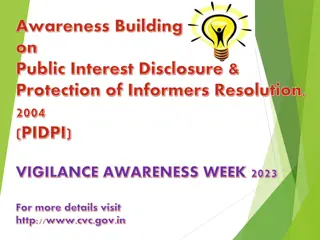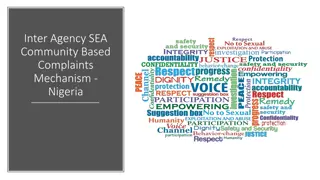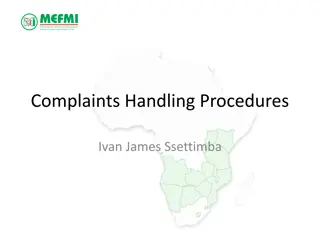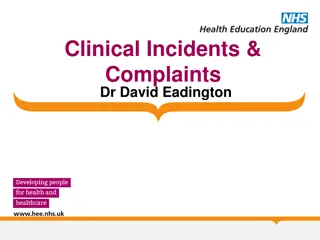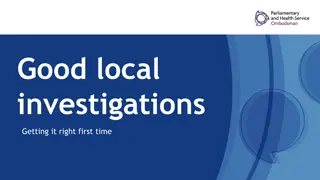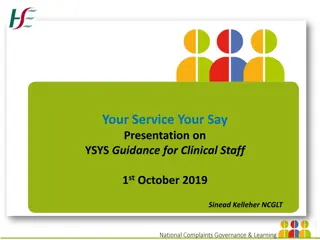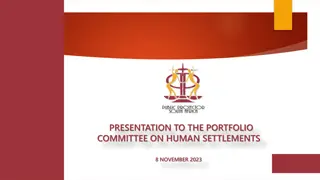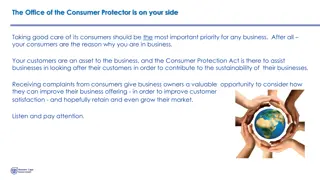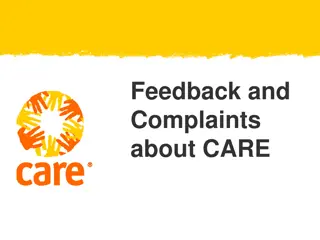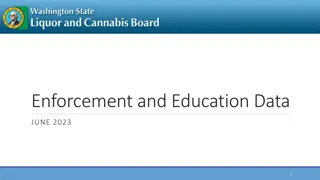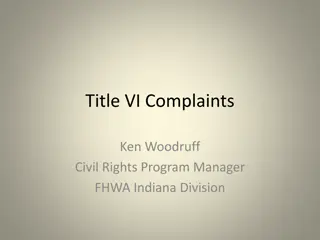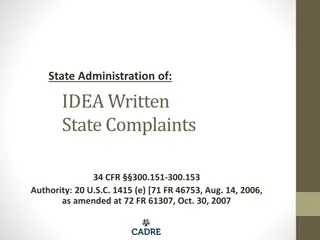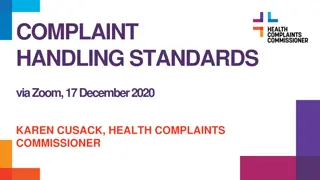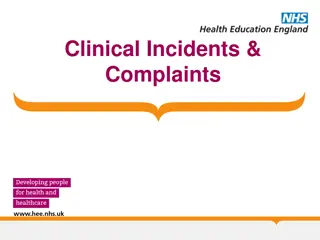Comprehensive Training Workshop on Complaints Management System Benefits and Implementation
Explore the importance of using the CMS to enhance patient safety, improve healthcare provision, and facilitate systematic analysis of patient complaints. Learn how a standardised information system can identify trends, support quality assurance, and streamline the complaints process. Discover the key recommendations and responses for implementing Your Service Your Say across healthcare organisations.
Download Presentation

Please find below an Image/Link to download the presentation.
The content on the website is provided AS IS for your information and personal use only. It may not be sold, licensed, or shared on other websites without obtaining consent from the author.If you encounter any issues during the download, it is possible that the publisher has removed the file from their server.
You are allowed to download the files provided on this website for personal or commercial use, subject to the condition that they are used lawfully. All files are the property of their respective owners.
The content on the website is provided AS IS for your information and personal use only. It may not be sold, licensed, or shared on other websites without obtaining consent from the author.
E N D
Presentation Transcript
Complaints Management System Workshop for trainers of Complaints Officers Oct 2019
Why use the CMS: The Francis Report The Francis Report highlighted the role of using patient complaint data to improve patient safety. Analysing data on negative patient experiences strengthens the ability of healthcare organisations to detect systematic problems in care. Reader TW, Gillespie A, Roberts J. Patient complaints in healthcare systems: a systematic review and coding taxonomy. BMJ Qual Saf 2014;23:678-689.
Why use the CMS: Learning to Get Better Learning to Get Better: Recommendation 13. The HSE should introduce a standard approach to implementing Your Service Your Say across the public health service. This should include .standard categorisation of complaints to allow for comparison on complaint handling, subjects and outcomes between hospitals and hospital groups. Learning to Get Better: Recommendation 19. A standardised information system for the recording of complaints, comments and compliments should be developed across the hospital groups.
Learning to Get Better: Response Learning to Get Better: Recommendation 13 and 19. RESPONSE The HSE has developed a Complaints Management System with an expanded HSE coding taxonomy based on a thematic analysis of the complaints to identify particular complaint issues. These now extend to 153 sub-categories. E.g. Safe & Effective Care Infection prevention and control Non compliance with Infection and Control policies and protocols Other international taxonomies are also being investigated.
Benefits of a standardised information system Complaint data can be used to identify problems: when aggregated - potentially indicates problematic trends in healthcare provision. enables systematic analysis and standardised investigative techniques - essential for learning from patient complaints. can be used with a secondary data source. the Complaints Management System is: Standardised Centralised Web-based Live! Capturing live data on Stage 2 complaints.
The Complaints Management System supports the quality assurance process of complaints management The CMS is designed to completely support each step of Stage 2 of the complaints process end-to-end complaint reporting tracking of investigations, outcomes and recommendations
CMS Current Usage Oct 2019
Usage to date 2019 All issues subject to legislation 24 3 41 25 15 49 67 40 18 No issues subject to legislation 11 Some issues subject to legislation Recorded on CMS 35 3 42 50 22 50 69 55 54 2018 @ 18/09/2019 6 10 84 80 57 21 5 127 128 Area CHO 1 CHO 2 CHO 3 CHO 4 CHO 5 CHO 6 CHO 7 CHO 8 CHO 9 undefined Users Trained 37 17 7 99 49 51 36 87 93 1 1 7 9 15 1 0 5 18 2 9 18 1 689 170 191 476 327 468 560 168 81 275 289 453 51 1 72 83 36 5 71 1 36 102 7 702 165 235 354 336 517 63 2890 38 36 17 57 29 22 RCSI DMHG IEHG SSWHG Saolta ULH 2 16 2 8 2 60 2761 52 2160 4 296 3 259 1 46 7 NAS
NCGLT Reports NCGLT Annual Report: Health Service Complaints Process Compliance Annual Area Reports: Classification driven Ad hoc Reports CHOs/HGs Scheduled Reports Ad hoc Reports
Potential Scheduled Reports Causes/Classification of complaints The total number of complaints on-hand and pending The total number of complaints received in a given month The types of the complaints received (broken down into 243 categories) Complaints and Reviews that result in a recommendation. Recommendations implemented Complaints excluded under Part 9 of the Health Act 2004 Complaints dealt with informally at Stage 2 Reviews resolved informally at stage 3 Complaints withdrawn at stage 2 or 3 Complaints dealt with within 30 working days at Stage 2 Complaints that took longer than 30 days to deal with at Stage 2 Reviews that were dealt with within 20 working days at Stage 3 Reviews that took longer than 20 working days at Stage 3 Complaints resolved through mediation
CMS Steering Group Oct 2019
CMS Steering Group The CMS Steering Group has been established to provide governance and direction for the implementation and further development of agreed modules of the Complaints Management System. The group also functions as an approval committee and clearing house for change requests from users of the CMS before changes are then forwarded to the NIMS Steering Group. Each member of the CMS Steering Group is a nominated CMS Lead and represents their own CHO or Hospital Groups current and future requirements with regard to complaints management and reporting on the CMS.
CMS Steering Group During 2019: the following changes have been made to the CMS Extended division data Onsite/Offsite Incident date The following pilots have been ongoing Point-of-Contact Complaints Module Positive Feedback Module
CMS Data Quality Audit 2019 Oct 2019 National Complaints Governance & Learning
2019 Data Quality Audit During 2019 the NCGLT conducted a data quality audit of data that was recorded on the CMS during 2018. 2 CHOs recorded a small number of complaints that were assigned closed dates but had not been actually closed out on the CMS. These were corrected in the final report. 2 HGs recorded a number of complaints that were assigned closed dates but had not been actually closed out on the CMS. These were corrected in the final report. In 2 Hospital Groups, in 5 Hospitalsthe legislative status of some complaints recorded was entered incorrectly to significant levels. This was corrected as the data entered was incorrect. In 1 Hospital, it failed to record any associated issues. In 1 Hospital Group, 3 Hospitals had such extensive inaccuracies in the data recorded that no further breakdown or analysis of complaints and issues for these hospitals was possible. In 2 Hospital Group reports, data entered for 5 hospitals was so small, these Hospitals will not be examined.
2019 Data Quality Audit: General Findings Staff involved in complaints investigations need a clearer understanding of which complaints fall under the Health Act, 2009. Identified Hospitals and specific CHO services need refresher training. Staff in identified areas need to use the CMS Support Form.
CMS 2018 Data: What can we learn Oct 2019
More detailed reporting capability Figure 7: Breakdown of complaints recorded by Community Services per 100,000 general population / population per county
More detailed reporting capability 1400 1200 Resolved > 30 working days, Exempt, Withdrawn, Open 1000 Resolved informally 800 600 Resolved through formal investigation 30 working days 400 KPI 75% 200 0 CHO 1 CHO 2 CHO 3 CHO 4 CHO 5 CHO 6 CHO 7 CHO 8 CHO 9 Complaints resolved by Complaints Officers either informally or formally within 30 working days against the target line of 75%
More detailed reporting capability National Complaints Governance & Learning
More detailed reporting capability National Complaints Governance & Learning
More detailed reporting capability Hospital 1: Safe and Effective Care top 5 IssuesSub Category Issue Type 5 Failure / delay in treatment / delivery of care Sub Category Type Treatment and Care 4 4 Diagnosis - misdiagnosis Diagnosis - delayed diagnosis Diagnosis Diagnosis 2 Health Care Associated Infection Infection prevention and control Cleanliness of area Hospital 2: Safe and Effective Care top 5 IssuesSub Category Issue Type 1 Failure to provide a safe environment 2 Hygiene Sub Category Type Health and Safety issues 1 Failure / delay in treatment / delivery of care Treatment and Care 1 Unsuccessful treatment or care Treatment and Care 1 Diagnosis - contradictory diagnosis Diagnosis 1 Unsatisfactory treatment or care Treatment and Care
More detailed reporting capability Hospital 3: Safe and Effective Care top 5 IssuesSub Category Issue Type Sub Category Type 7 Diagnosis - delayed diagnosis Diagnosis 5 Diagnosis - contradictory diagnosis Diagnosis 4 Other Discharge 3 Diagnosis - misdiagnosis Diagnosis 3 Failure / delay in treatment / delivery of care Treatment and Care Hospital 4: Safe and Effective Care top 5 IssuesSub Category Please Specify Sub Category Type 21 Other Continuity of care (internal ) 7 Unsatisfactory treatment or care Treatment and Care 6 5 2 Diagnosis - delayed diagnosis Other Failure / delay in treatment / delivery of care Diagnosis Diagnosis Treatment and Care
Using the CMS DEMO Oct 2019
Thank You Thank You


